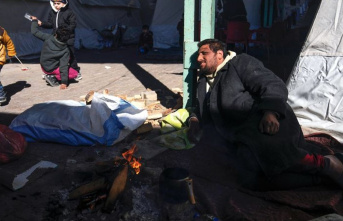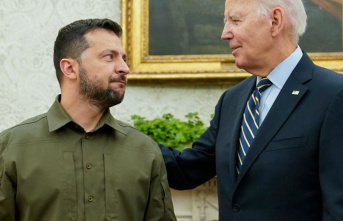and must have a lift after the forthcoming Brexit Germany, 30 per cent of the EU expenditure; that would be 150 billion euros. This requires that all EU member States also participate in the subsequent repayment. Otherwise, it is for us to be even more expensive.
The German contribution to the goal of economic recovery is illustrated by the Federal government as an act of well-established solidarity. What is true to the extent that the German exporters should be able to find only there is buyers for their products and services, where the economy is running reasonably. Our solidarity is therefore sold as export promotion.
This is, of course, the question of what the new EU Fund distributed funds are to be used in the individual countries – whether for consumption or for investment with perspective. And which companies from which countries will get which jobs. There is a staircase would be a joke, if, for example, Chinese state corporations have benefited. About the author: Hugo Müller-Vogg
Dr. Hugo Müller-Vogg publicist and former publisher of the FAZ is.
Hugo Müller-Vogg/Laurence Chaperon Considerable burden on the German taxpayerwe have to Be optimistic and that the funds in the beneficiary countries were primarily Italy and Spain, but also France – reasonable and sustainable investment. We assume, furthermore, that in the order books of German companies, clearly beats low. Then, this Operation has meant, however, a considerable burden on the German taxpayer from the year 2027, when the debt through the EU budget should be repaid.
In the case of solidarity with the of the pandemic particularly affected the Italians and the Spaniards, the note must be allowed, that some countries are doing today easier, if they had been historically solid.
Spain can at least claim to have, under the great efforts of the Euro-crisis economically reasonably Occurs in focus. Italy has, however, in the past, very good years wasted and nothing for the rehabilitation of its ailing state finances. At the same time, private assets have risen in Italy to a new all-time highs. According to calculations by Credit Suisse, the Italian private assets are the 5.5-Times the gross domestic product. In Germany, the power of private assets as opposed to only 3.8 Times the economic output. This also has to do with the fact that no Italian government has seriously tried, with the same meticulousness as the German tax authorities collect taxes.
The result is bizarre: The Germans are – as measured by Per capita wealth – poorer than the Italians, the German state, however, was much financial strong as the Italian. With the consequence that the "poor" German taxpayers should Finance the "poor" Italian state. While the wealthy Italians invest their financial assets, preferably outside of their own borders.
Merkel and Macron see the "foundations for a new Europe"In the reconstruction Fund, Emanuel Macron, and Angela Merkel will see the "Foundation stone for a new Europe". Your new Europe will be as big as the previous on solidarity between States to depend on. Only solidarity should not be viewed as a one-sided affair, as the Engagement of the economically Stronger to the benefit of the Weaker. Properly understood, solidarity includes corresponding efforts of those who expect help. Otherwise, for those who want to help, resentment that can quickly in unwillingness to lead.
All the information about the Coronavirus in the News-Ticker of FOCUS Online.
The EU will support in difficulties countries, regardless of the name it will bear the corresponding financial instrument. The German taxpayers will not Finance, if in other countries, nothing will change, social services, indirectly, that is Germany itself. So Spain does not want to introduce an unconditional basic income there is. Italy is billions in tax revenue, and keeps the retirement age at age 65 (women: 60), while the German tax authorities accesses merciless and the Germans on the pension with 67 move.
France, in turn, his workers treat it with 10,14 Euro, the second-highest minimum wage in the EU, can pay off many companies, but only thanks to government subsidies. German low-wage earners must be satisfied, however, with 9.35 euros. The consent to the urgently needed pension reform, want to buy Macron, in addition, a minimum pension of 1000 euros per month. Since our planned basic pension can't keep up.
the citizens of The donor countries have the right to a solidarity-based behavior of the receiverone can not argue with: The common market is not to the detriment of Germany. In return, the Federal Republic was often the paymaster of Europe. The German taxpayers have accepted this "Deal" so far, most of the time. In the light of the Corona-induced economic dislocation, the threat of insolvency and vulnerable business models could decrease the willingness to show solidarity with other countries, however, especially if there is a lack of the beneficiaries of "solidarity-based restrictions".
Europe can't function without solidarity. But also the citizens of the donor countries have the right to the solidarity of the receiver. "No, no, no": the Previous statement brings Virologist at the Markus Lanz show a DWD "no, no, no": the Previous statement brings Virologist at Markus Lanz, a
Date Of Update: 22 May 2020, 12:28










